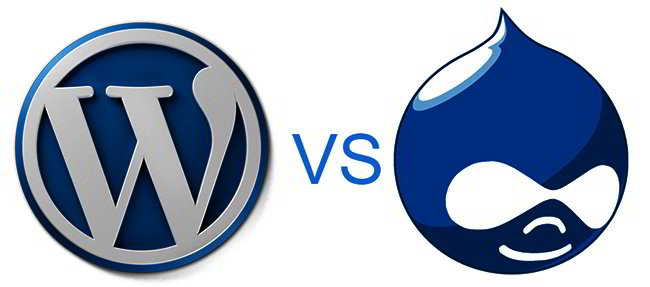WordPress vs. Drupal Web Hosting
Deciding on which web hosting platform to use to develop and manage your website can be difficult but don’t let this deter you. WordPress and Drupal are the top two options in terms of popularity, and they actually have a good bit in common. Both were released in the early 2000s, are free and have one-click installation available, but there is a lot more to consider when making your decision including ease of use, customizing features (plug-ins and themes), upgrading, mobile use and more. You’ll need to take your time to make the right decision. In this article, I will help you make it quicker by delving into the differences of WordPress and Drupal.

Let’s start with WordPress…
With over 140 million downloads, WordPress web hosting is a lot more popular simply because it is easier to use. It is the clear winner in terms of user interface. Even if you are a newbie starting your first website, you can have it up and running in a short amount of time (just minutes) when using WordPress. WordPress’ WYSIWYG (What You See Is What You Get) HTML Editor makes this a very simple task. Also, because of its larger number of users, there is a lot more advice available to WordPress users who are in need of help. They even offer a community support forum. When it comes to website customization, WordPress has a number of plug-ins and free and premium themes available. In fact, there are 2,000 plus free themes and 27,000 plus free plugins. In addition, both WordPress and Drupal update frequently; however, with WordPress, users don’t have to do anything for the changes to take effect.
Unlike Drupal, WordPress also has an app that allows for very easy mobile posting, editing and more. If your website needs the ability for multi-author publishing, WordPress is again the easier choice. There are a few different types of authors including the Administrator, Editor and Subscriber. Some of the few issues brought up by WordPress users include difficulty making changes to the framework of a site and concerns about a more robust server needed for sites with thousands of viewers daily. Though Drupal has a more extensive default caching features, WordPress has caching plugins that can help with page load times. For both WordPress and Drupal, Schemas can be added to views or hard-coded to template files, and Content Delivery Networks can be integrated to serve assets to the closest local distribution point.
And now Drupal
For starters, in comparison, Drupal has only 15 million downloads. Secondly, in order to use Drupal, it is important to have at least basic knowledge of HTML, but unfortunately, it has a smaller community to get advice from. It was actually designed with developers in mind, but this doesn’t mean others can’t learn to use it. In fact, you will probably want to. Drupal actually has many more customization features available to users if you do know how to use them. It is also more technologically advanced and has more improved performance; but again, even to upgrade Drupal, you have to have a bit of developer knowledge because these upgrades don’t include code. As mentioned before, both Drupal and WordPress are free to download. Similar to WordPress but not quite comparing, Drupal has over 1,800 free themes and over 24,000 free plugins. However, when it comes to plug-ins and themes available for purchase, Drupal’s are much more expensive. With that said, like I mentioned earlier, customization is the main reason why choosing Drupal is beneficial. You can make something unique and data-rich without using the plug-ins that would be needed if you were using WordPress instead.
When it comes to mobile themes, both WordPress and Drupal offer them, but Drupal mobile displaying can be a bit more challenging. In contrast, Drupal is more secure than WordPress. Drupal web hosting can also support anything from a one page static website to a site that has thousands of pages or even thousands of readers at a time. Again, Drupal’s caching features are more in depth. Drupal is even said to be a bit more search engine friendly as well, though this may not be actually true. It has not been proven. Even though at first glance WordPress may seem like the obvious choice, using Drupal definitely gives you more options. Knowledge and experience seem to be the only two obstacles to overcome when using this platform.
So what are the deciding factors?
Overall, it is all about how much knowledge you have of website management and what you will be using the website for. WordPress web hosting, used by CNN, Forbes, Sony and The New York Times is the ideal choice for those interested in creativity and publishing content, for example beginning bloggers. However, the alternative, Drupal, is used by large outlets like The Economist, Warner Brothers and the White House as well, and is for those expecting rapid growth for their site and those in need of extensive features. I hope this article has helped you become more informed about each web hosting service but it really is up to you to answer the two questions above regarding your experience and intended use to make your decision.
